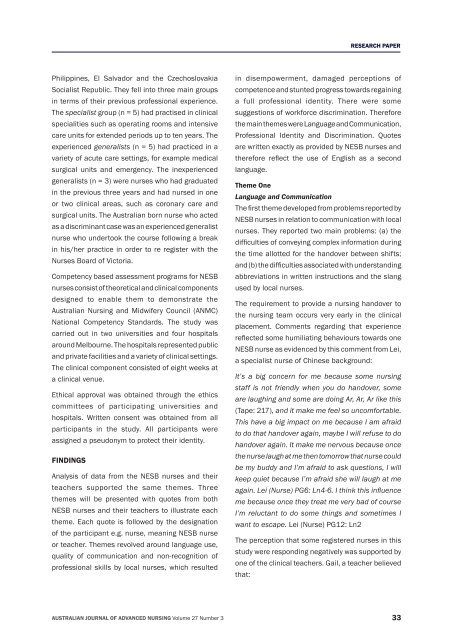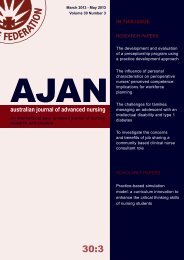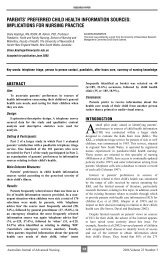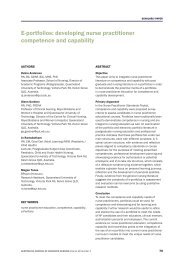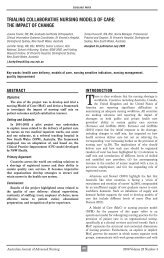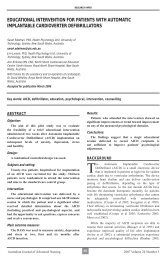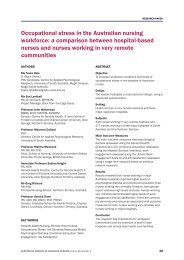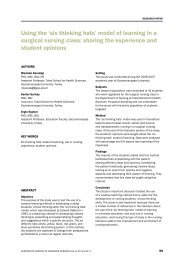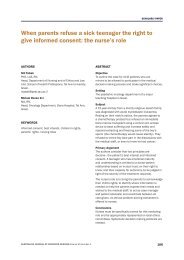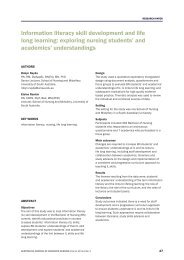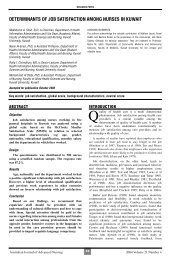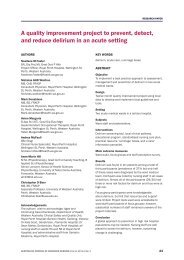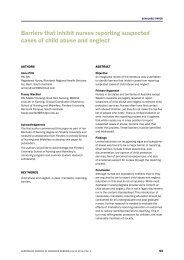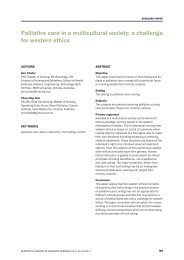March-May, 2010 - Australian Journal of Advanced Nursing
March-May, 2010 - Australian Journal of Advanced Nursing
March-May, 2010 - Australian Journal of Advanced Nursing
Create successful ePaper yourself
Turn your PDF publications into a flip-book with our unique Google optimized e-Paper software.
RESEARCH PAPER<br />
Philippines, El Salvador and the Czechoslovakia<br />
Socialist Republic. They fell into three main groups<br />
in terms <strong>of</strong> their previous pr<strong>of</strong>essional experience.<br />
The specialist group (n = 5) had practised in clinical<br />
specialities such as operating rooms and intensive<br />
care units for extended periods up to ten years. The<br />
experienced generalists (n = 5) had practiced in a<br />
variety <strong>of</strong> acute care settings, for example medical<br />
surgical units and emergency. The inexperienced<br />
generalists (n = 3) were nurses who had graduated<br />
in the previous three years and had nursed in one<br />
or two clinical areas, such as coronary care and<br />
surgical units. The <strong>Australian</strong> born nurse who acted<br />
as a discriminant case was an experienced generalist<br />
nurse who undertook the course following a break<br />
in his/her practice in order to re register with the<br />
Nurses Board <strong>of</strong> Victoria.<br />
Competency based assessment programs for NESB<br />
nurses consist <strong>of</strong> theoretical and clinical components<br />
designed to enable them to demonstrate the<br />
<strong>Australian</strong> <strong>Nursing</strong> and Midwifery Council (ANMC)<br />
National Competency Standards. The study was<br />
carried out in two universities and four hospitals<br />
around Melbourne. The hospitals represented public<br />
and private facilities and a variety <strong>of</strong> clinical settings.<br />
The clinical component consisted <strong>of</strong> eight weeks at<br />
a clinical venue.<br />
Ethical approval was obtained through the ethics<br />
committees <strong>of</strong> participating universities and<br />
hospitals. Written consent was obtained from all<br />
participants in the study. All participants were<br />
assigned a pseudonym to protect their identity.<br />
FINDINGS<br />
Analysis <strong>of</strong> data from the NESB nurses and their<br />
teachers supported the same themes. Three<br />
themes will be presented with quotes from both<br />
NESB nurses and their teachers to illustrate each<br />
theme. Each quote is followed by the designation<br />
<strong>of</strong> the participant e.g. nurse, meaning NESB nurse<br />
or teacher. Themes revolved around language use,<br />
quality <strong>of</strong> communication and non‐recognition <strong>of</strong><br />
pr<strong>of</strong>essional skills by local nurses, which resulted<br />
in disempowerment, damaged perceptions <strong>of</strong><br />
competence and stunted progress towards regaining<br />
a full pr<strong>of</strong>essional identity. There were some<br />
suggestions <strong>of</strong> workforce discrimination. Therefore<br />
the main themes were Language and Communication,<br />
Pr<strong>of</strong>essional Identity and Discrimination. Quotes<br />
are written exactly as provided by NESB nurses and<br />
therefore reflect the use <strong>of</strong> English as a second<br />
language.<br />
Theme One<br />
Language and Communication<br />
The first theme developed from problems reported by<br />
NESB nurses in relation to communication with local<br />
nurses. They reported two main problems: (a) the<br />
difficulties <strong>of</strong> conveying complex information during<br />
the time allotted for the handover between shifts;<br />
and (b) the difficulties associated with understanding<br />
abbreviations in written instructions and the slang<br />
used by local nurses.<br />
The requirement to provide a nursing handover to<br />
the nursing team occurs very early in the clinical<br />
placement. Comments regarding that experience<br />
reflected some humiliating behaviours towards one<br />
NESB nurse as evidenced by this comment from Lei,<br />
a specialist nurse <strong>of</strong> Chinese background:<br />
It’s a big concern for me because some nursing<br />
staff is not friendly when you do handover, some<br />
are laughing and some are doing Ar, Ar, Ar like this<br />
(Tape: 217), and it make me feel so uncomfortable.<br />
This have a big impact on me because I am afraid<br />
to do that handover again, maybe I will refuse to do<br />
handover again. It make me nervous because once<br />
the nurse laugh at me then tomorrow that nurse could<br />
be my buddy and I’m afraid to ask questions, I will<br />
keep quiet because I’m afraid she will laugh at me<br />
again. Lei (Nurse) PG6: Ln4‐6. I think this influence<br />
me because once they treat me very bad <strong>of</strong> course<br />
I’m reluctant to do some things and sometimes I<br />
want to escape. Lei (Nurse) PG12: Ln2<br />
The perception that some registered nurses in this<br />
study were responding negatively was supported by<br />
one <strong>of</strong> the clinical teachers. Gail, a teacher believed<br />
that:<br />
AUSTRALIAN JOURNAL OF ADVANCED NURSING Volume 27 Number 3 33


